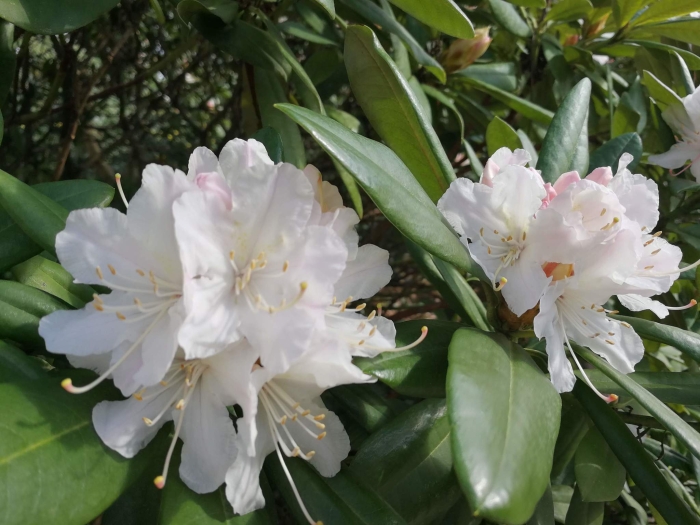Great Laurel
(Rhododendron maximum)
Great Laurel (Rhododendron maximum)
/
/

© bemma
CC BY 4.0
Image By:
© bemma
Recorded By:
Copyright:
CC BY 4.0
Copyright Notice:
Photo by: © bemma | License Type: CC BY 4.0 | License URL: http://creativecommons.org/licenses/by/4.0/ | Uploader: bemma | Publisher: iNaturalist |











































































Estimated Native Range
Summary
Rhododendron maximum, commonly known as Great Laurel, is an evergreen shrub native to the understory of mesic, southern Appalachian forests, as well as mixed hardwood and coniferous forests in Eastern North America. It can reach a height of 4 meters (13 feet), but occasionally grows up to 10 meters (33 feet) in the right conditions. The Great Laurel is one of the largest and hardiest rhododendrons available commercially, with a broad, dense growth habit that provides substantial cover and protection in its ecosystem.
The plant is known for its large, showy flowers that bloom in June and July, ranging in color from white to purple, often with distinctive greenish-yellow spots. The blooms are highly valued for their aesthetic appeal, making the Great Laurel a popular choice for ornamental plantings. Its deep-green, waxy leaves can last up to 8 years before falling and are slow to decompose, contributing to a thick, peat-like humus in the soil. The fruit is a dry capsule containing numerous small seeds. In cultivation, it is appreciated for its year-round foliage and its ability to provide shelter for wildlife. The wood is very hard and occasionally used for specialty wood products. Great Laurel is often used in border plantings, as a foundation plant, and for naturalizing in shady areas. It thrives in deep, well-drained acidic soils rich in organic matter and prefers part shade to full shade with medium water requirements. It has a remarkable ability to avoid cavitation during freeze-thaw cycles. However, gardeners should be cautious as the leaves can be poisonous, and the plant may struggle in poorly drained soils or overly sunny locations.CC BY-SA 4.0
The plant is known for its large, showy flowers that bloom in June and July, ranging in color from white to purple, often with distinctive greenish-yellow spots. The blooms are highly valued for their aesthetic appeal, making the Great Laurel a popular choice for ornamental plantings. Its deep-green, waxy leaves can last up to 8 years before falling and are slow to decompose, contributing to a thick, peat-like humus in the soil. The fruit is a dry capsule containing numerous small seeds. In cultivation, it is appreciated for its year-round foliage and its ability to provide shelter for wildlife. The wood is very hard and occasionally used for specialty wood products. Great Laurel is often used in border plantings, as a foundation plant, and for naturalizing in shady areas. It thrives in deep, well-drained acidic soils rich in organic matter and prefers part shade to full shade with medium water requirements. It has a remarkable ability to avoid cavitation during freeze-thaw cycles. However, gardeners should be cautious as the leaves can be poisonous, and the plant may struggle in poorly drained soils or overly sunny locations.CC BY-SA 4.0
Plant Description
- Plant Type: Shrub
- Height: 5-15 feet
- Width: 5-12 feet
- Growth Rate: Slow
- Flower Color: Purple, Pink, White
- Flowering Season: Spring
- Leaf Retention: Evergreen
Growth Requirements
- Sun: Part Shade, Full Shade
- Water: Medium
- Drainage: Fast, Medium
Common Uses
Bee Garden, Bird Garden, Border Plant, Butterfly Garden, Hummingbird Garden, Rabbit Resistant, Showy Flowers, Water Garden
Natural Habitat
Understory of mesic, southern Appalachian forests, as well as mixed hardwood and coniferous forests in Eastern North America
Other Names
Common Names: Rosebay Rhododendron, Great Rhododendron, American Rhododendron, Big Rhododendron, Rhododendron Géant, Rosage Élevé, Great-Laurel
Scientific Names: , Rhododendron maximum, Rhododendron purpureum, Rhododendron maximum var. roseum, Rhododendron ashleyi, Rhododendron maximum f. album, Rhododendron maximum var. album, Hymenanthes maxima, Rhododendron bigener, Rhododendron fragrans
GBIF Accepted Name: Rhododendron maximum L.